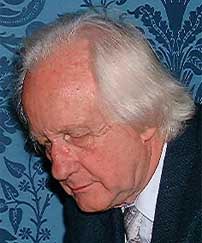Solana's
(and the EU's?)
Foreign Policy: A Non-Starter

By
Johan
Galtung, dr hc mult, Professor
of Peace Studies,
Director, TRANSCEND:
A Peace and Development Network
TFF
associate
July 23, 2004
Here is a short critique of
Javier
Solana's paper on European
security of 20 June
2003, which Johan Galtung gave two weeks ago at a meeting
with EU officials in Luxembourg.
Another longer paper with constructive proposals will
follow later. Comments are welcome to
galtung@transcend.org
By Reading Javier Solana's "A
Secure Europe in a Better World" calls to mind the famous
prison director Herr Obermeyer in Germany with a fabulous
record of low recidivism. His prisoners became
law-abiding citizens upon release. Of course there was a
study commission to uncover his method. And the
conclusion: "Die Methode des Herrn Obermeyer ist Herr
Obermeyer selbst" - Mr Obermeyer, meaning his
personality, is his own method
"Das Problem des Herrn Solana ist
Herr Solana selbst"? Mr Solana is his own problem?
Partly, yes. Long time ago he was against Spanish
membership in NATO to win Spanish elections, then worked
for that membership, and finally became NATO's Secretary
General (Aznar was at least consistently pro-USA). So
from Solana little is to be expected. His analysis is
autistic. He locates all the problems on the outside in
his "Europe faces three key threats": international
terrorism, particularly with weapons of mass destruction,
failed states, and organized crime. They are significant
factors. But how did they come into being?
The extrapunitive personality
locates problems in Other and sees himself as victim
only; the intrapunitive sees Self as the key perpetrator,
spinning causal chains from Self via Other and then back
to Self as violence. Neither Solana's, nor the other
extreme position is analysis but rather projections of a
psycho-political inclination. US imperialism is certainly
a key factor in producing all three; so is EU inability
to distance itself from the USA and some of EU's own
policies. But there is more.
Analysis is located between Solana
and Yanqui go home. Of course "international terrorism",
like US state terrorism, are parts of a vicious cycle of
retaliation, and the outcomes of unresolved conflicts.
Equally obviously, they also draw energy from religious
fundamentalism. Islam, the Arab world and Palestine have
been and are trampled upon by the West and by Israel.
Their right to resist is not disputed, but they could
have used more effective nonviolent methods in the
struggle. Through NATO and Iraq war participation, with
notable exceptions but their line is not (yet?) EU
foreign policy (and Solana sounds more like Aznar than
like Zapetero), the EU should not be surprised if the
"war on terrorism" reverts to themselves. Of course
countries that support the USA put themselves at
risk
And that USA is no longer "in a
dominant position as a military actor". War is no longer
fought with the means the USA has at its disposal. It is
fought by a method invented in Solana's own country, the
guerilla, by small units of people undistinguishable
from, and supported by, people in general and more
willing to give their life for their cause than US kids
fighting for money to get through college. Supply of
material for bombs is no problem. Including dirty bombs.
Not ABC. D
Solana is decades behind in his
"analysis", also missing the major factor: differential
vulnerability. Several EU countries can come close to
paralysis by a nonviolent strike of their Muslim
population alone. Less autism, more reciprocity is indeed
called for if only for the classical reason that the
balance of force is no longer in the West's favor; force
power being located in the interface between capacity to
destroy and vulnerability. What is more vulnerable, the
Twin Towers or an average Afghan mountain? True, there
are stooges on top in Kabul and Baghdad. But the
resistance is everywhere else
Above all, however: there is no
conflict analysis in Solana's approach, no effort to
clarify the goals of the parties, to discuss what is
legitimate and what not, and then to reconcile the
legitimate goals. "The outbreak of Conflict in the
Balkans was a reminder that war has not disappeared from
our continent". The EC/EU neither understood the Serb
position of not being ruled from Zagreb, Sarajevo and
Pristina, nor did they follow the UN Secretary General's
advice. Major EC/EU mistakes in no way exonerate the
Serbs for their atrocities, however. Both sides would
have benefitted from honest conflict analysis
Solana substitutes for conflict
analysis US style security analysis. Where has this
mental aberration led the USA? Take failed states. Of
course they fail when told to be only l'etat gendarme and
never l'etat provident, dropping subsidies and buying
equipment against demonstrators and guerrillas instead,
on a downward spiral. External assistance can never be a
substitute, only a complement in a state already trained
in providing basic needs for its own people
Take organized crime. As has been
said so often, drugs depends on supply, and on demand.
The demand is in Europe and in the USA, mainly the latter
and is probably related to anomie and atomie,
normlessness and fragmentation of social structure. And
yet the "war on drugs" is in drug-producing countries,
with success at the end of the Taliban regime, now
flourishing more than ever. Where is the certification of
progress in reducing demand in the EU and in the USA? Who
certifies whom? Where is the Plan EU and Plan USA to
complement Plan Colombia? And then, don't underestimate
the sympathy for organized crime that hits the rich and
the rich countries as one more form of
guerrilla
Solana wants more resources for
defense. That was/is the US approach. Where did it bring
the USA? Drop Solana, not bombs.
©
TFF & the author 2004

Tell a friend about this article
Send to:
From:
Message and your name
|